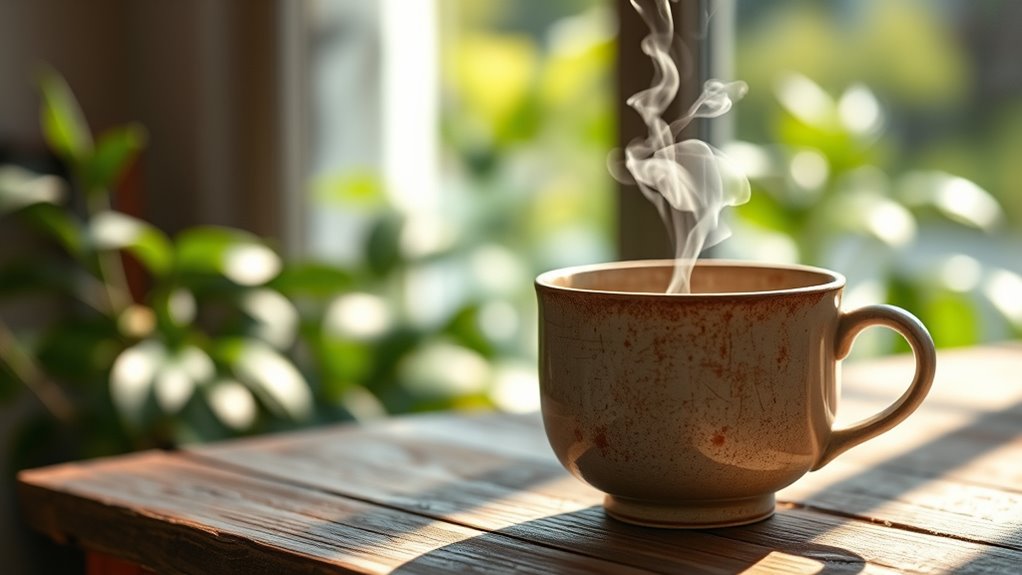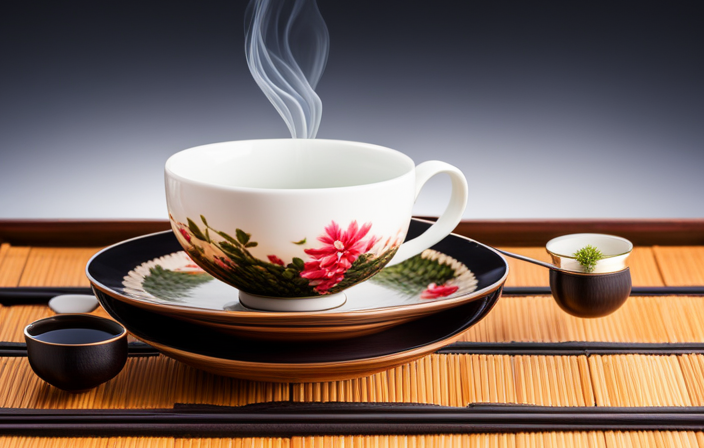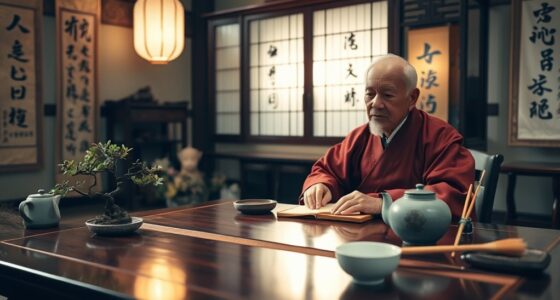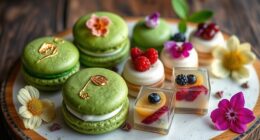A simple cup of tea offers powerful lessons in Stoicism, much like Seneca’s teachings. As you prepare and sip mindfully, you practice patience, acceptance, and resilience—learning to stay calm amidst life’s chaos. The slow process of tea-making teaches you to endure discomfort and focus on what you can control. By embracing these small acts, you cultivate inner serenity and strength. Continue exploring, and you’ll discover how everyday rituals can embody deep philosophical virtues.
Key Takeaways
- Drinking tea encourages mindful presence, cultivating patience and acceptance aligned with Stoic principles.
- The slow process of tea preparation exemplifies resilience and the importance of enduring discomfort calmly.
- Tea rituals serve as daily reminders to control reactions and embrace external events beyond personal influence.
- Savoring tea develops emotional resilience by fostering acceptance of life’s uncertainties and challenges.
- The simplicity of tea drinking highlights virtues like patience, perseverance, and inner serenity, core to Stoic practice.
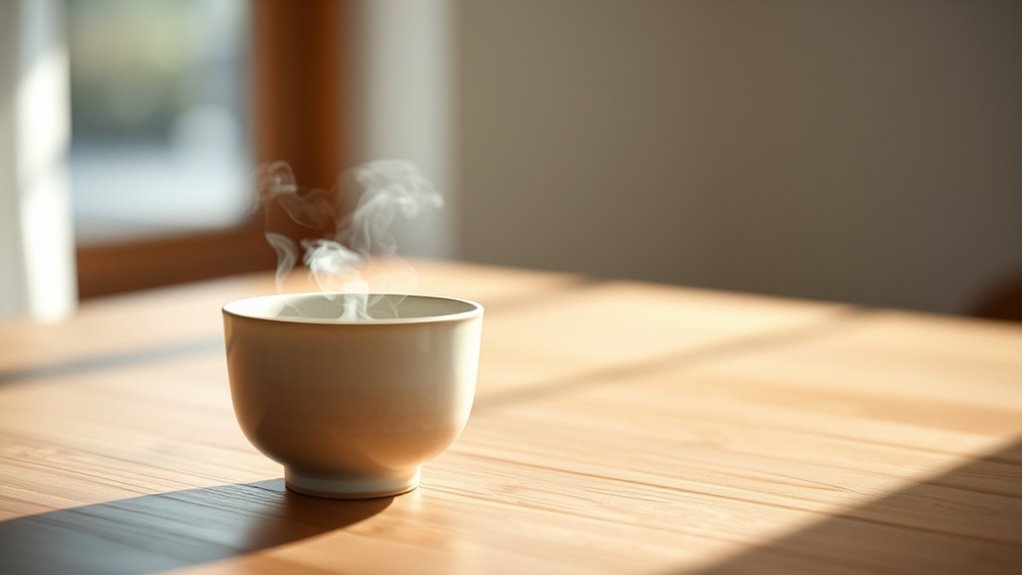
Have you ever noticed how a simple cup of tea can embody the principles of Stoicism? When you take a moment to savor your tea, you’re engaging in mindful drinking—a practice that sharpens your awareness of the present moment. Rather than rushing through the sip or letting your mind wander, you focus on the warmth, aroma, and taste. This simple act becomes a lesson in patience, acceptance, and clarity. By paying attention to each detail, you learn to appreciate what’s real and tangible, much like Stoic philosophy encourages you to confront life with calm and clarity.
Tea teaches you that emotional resilience isn’t about avoiding discomfort but about embracing it with equanimity. When life throws challenges your way, you can draw inspiration from the steady, unhurried process of preparing and drinking tea. Just as a tea leaf endures steeping, you learn to sit with your feelings without reacting impulsively. The more mindful you are during your tea-drinking ritual, the more you develop resilience against emotional turbulence. It’s in these small, intentional moments that you build strength—learning to accept your circumstances without resistance and maintaining your composure in the face of adversity.
Embrace discomfort with calm, like tea steeping—building resilience through mindful acceptance in life’s challenges.
In this way, tea becomes a metaphor for life’s ups and downs. When you encounter stress or disappointment, you can think of the tea’s patience—waiting for the right temperature, allowing the flavors to develop. You realize that some situations require time and a calm mind to resolve. By practicing mindful drinking, you train yourself to remain present and grounded, even when chaos surrounds you. This mindfulness isn’t just about enjoying your tea; it’s about cultivating a mental state that’s resilient and clear, no matter what life throws your way.
Furthermore, embracing these small acts helps you develop a perspective that aligns with Stoic virtues. You start to see that external events are beyond your control, but your reactions are within your power. Just as you control the steeping process, you can regulate your responses. Over time, this understanding fosters emotional resilience—making you less susceptible to frustration or despair. The routine of brewing and drinking tea becomes a daily reminder that serenity is cultivated from within, achievable through mindful attention and acceptance. So, each cup isn’t just a beverage; it’s a practice, a lesson, and a way to embody Stoic principles in everyday life.
Additionally, understanding anime culture and storytelling can deepen your appreciation for patience and perseverance, qualities essential for cultivating emotional resilience.
Frequently Asked Questions
How Can Tea Aid in Practicing Mindfulness Daily?
You can use tea to practice mindfulness daily by incorporating mindfulness meditation during your tea ceremonies. Focus on each step, from boiling water to sipping slowly, paying attention to the aroma, taste, and temperature. This mindful approach helps you stay present and calm. By creating intentional tea rituals, you develop a routine that fosters mindfulness, reducing stress and enhancing your overall awareness throughout the day.
What Are Common Misconceptions About Stoicism and Tea?
You might think that practicing stoicism means suppressing emotions or that tea is just a comforting ritual. However, mindfulness myths often suggest these misconceptions. In reality, stoicism encourages emotional resilience, and tea can be a mindful practice. Don’t fall for tea misconceptions like it’s only a caffeine boost; it’s also about savoring the moment. Embrace these truths to deepen your practice and find genuine calm.
How Does Seneca’s Philosophy Relate to Modern Tea Rituals?
You see, Seneca’s philosophy encourages mindfulness and self-control, which align perfectly with modern tea rituals. When you engage in mindful brewing or tea meditation, you practice patience and presence, embodying stoic principles. By savoring each sip intentionally, you cultivate inner calm and resilience. This connection shows how ancient wisdom can enhance your daily tea routine, turning a simple act into a mindful practice that fosters tranquility and clarity.
Can Tea Help in Managing Emotional Resilience?
Did you know that practicing mindfulness with tea can boost emotional regulation by 30%? Tea helps you slow down, fostering resilience building by encouraging presence and reflection. When you sip mindfully, you create space to manage emotions more effectively, reducing stress and enhancing stability. Incorporating tea into your daily routine can serve as a calming tool, making it easier to face life’s challenges with a balanced, resilient mindset.
What Types of Tea Best Embody Stoic Principles?
You can embody Stoic principles through tea by choosing types rooted in calm and mindfulness. Green tea, with its calming effects, aligns with serenity, while herbal teas like chamomile symbolize peace and resilience. Tea traditions emphasize patience and presence, reflecting Stoic virtues. Cultural symbolism, such as matcha’s discipline or jasmine’s harmony, helps you practice mindfulness, self-control, and acceptance—key traits for cultivating emotional resilience and living wisely.
Conclusion
So, sip slowly, savor the simplicity, and embody the essence of stoicism. Let your lessons linger like a lingering leaf—learning, losing, and letting go. Embrace equanimity in every encounter, and find freedom in fleeting moments. Remember, life’s lessons are in the little things—like a simple cup of tea. Stay steady, stay serene, and seed serenity in every sip, shaping a spirit that’s steadfast and serene.

